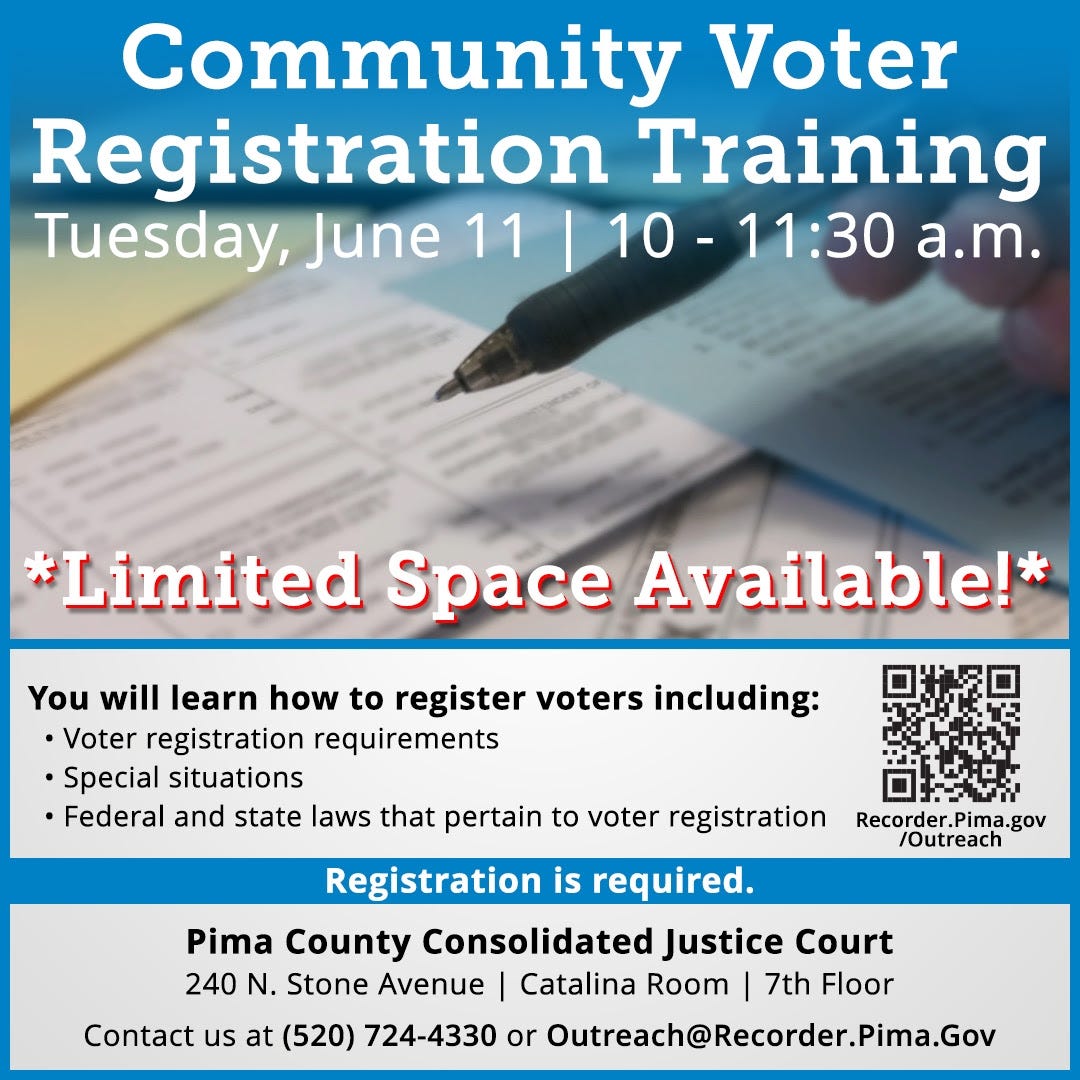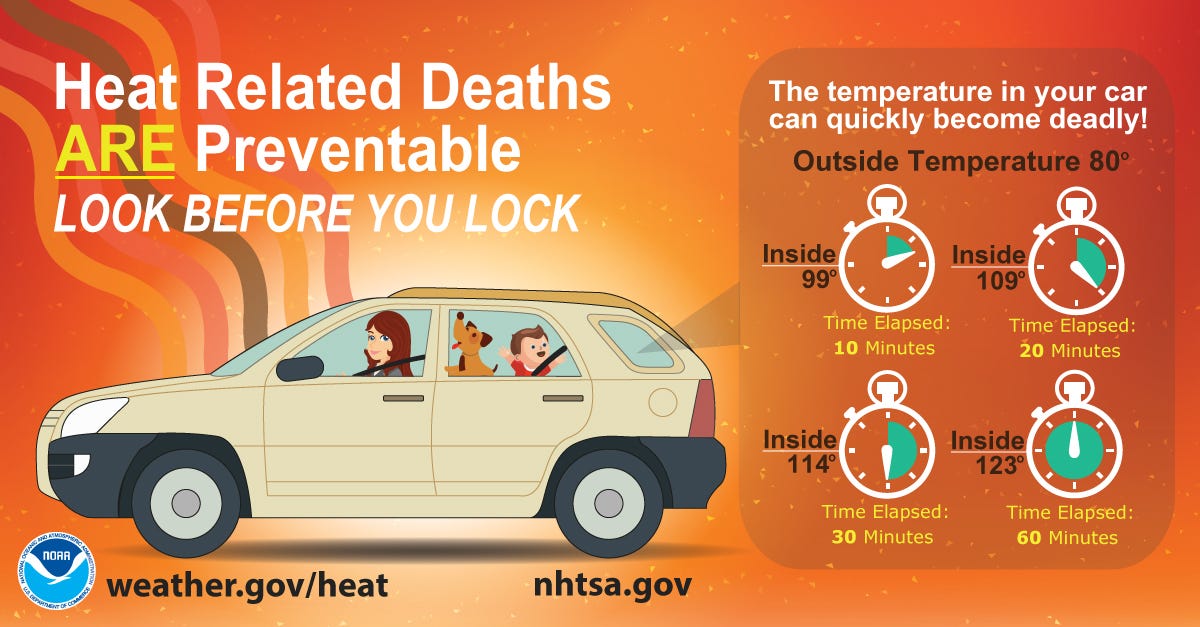The Daily Agenda: Straight up, with a twist
We made a wiki for the primary elections ... It's the next step in our plan to make sense of it all ... Ciscomani and Winn go head-to-head.
In less than a month, several hundred thousand Pima County residents are going to get a ballot in the mail.
That’s our time to shine. We see it as our job to help inform those voters as they sit down at the kitchen table, pen in hand, and fill in those bubbles for county supervisor, county attorney, sheriff, and a long list of other local offices.
As we wrote back in March when we explained our plan for covering local elections:
“Our main goals are to help you follow along during election season with steady coverage and to build the resources, such as a curated archive of news coverage, you need to quickly figure out what’s what and who’s who when your ballot arrives in the mail.”
In that spirit, we built a website ahead of the July 30 primary election (early ballots are sent out July 3). It houses the vast majority of news coverage of local elections and elected officials, along with videos of debates and interviews with candidates, and tools to figure out basic questions like, “Who is my state legislator?”
It’s still a work in progress. In fact, we designed it so it would be easy to update and tweak. That’s why we chose to make it a wiki, rather than a traditional website (plus, Curt has been dying to build a wiki for a long time). Wikis allow collaborative editing and make it easy to bounce around among a bunch of pages.
Our Tucson Agenda Election Wiki is a voter guide, but with a twist: We’re trying to open up the reporting world to voters.
You’ll find links to many of the resources we use in our reporting: Voter statistics, campaign finance reports, tools to background candidates, all the things we look up over and over during election season. And the search function is pretty good, so you’ll be able to quickly find everything we know about a candidate, issue, or whatever you’re interested in.
You can use those tools to do some sleuthing of your own, or you can just enjoy the fact that you have easy insight into how we do our election reporting. We’ll keep updating this reporting toolbox as we go.
It’s a pleasure to build tools like this for voters. If you want to see more of this type of thing, consider upgrading to a paid subscription.
We’re also addressing one of the most basic questions of election season: Why should I care about these offices? We’re curating local news coverage of county supervisors, the sheriff, and others so you can see the issues they’re in charge of handling.
As for why we’re launching it a month before early ballots go out, we want to have time to work out the technical kinks, flesh out all the information about the candidates and races, and above all, make it as readable as possible.
Our hope is that this will be a valuable, user-friendly tool when those ballots arrive.
We’ll update the wiki frequently as we cover elections over the next five months. As we do, we’d love to get feedback from readers, so feel free to contact us at info@tucsonagenda.com.
This story was supported by the Local News Initiative of Southern Arizona, a fund of the Community Foundation for Southern Arizona.
That’s a big price tag: Bill Buckmaster reported Tuesday that the estimated cost of private school vouchers in Arizona for the 2024 fiscal year is $337 million. Buckmaster interviewed the Grand Canyon Institute’s Research Director Dave Wells, who said the cost is a significant increase from previous years when the vouchers were primarily used by students with special needs. Wells said a significant portion of the voucher funds are going to wealthy families, particularly in the Scottsdale school district, which is one of the state’s wealthiest. You can listen to the interview here.
Coming soon to your ballot: A controversial House resolution known as the “Secure the Border Act” passed Arizona’s House of Representatives Tuesday and will now be on November’s ballot, Arizona Public Media’s Paola Rodriguez reports. House Concurrent Resolution 2060 would make it illegal for undocumented immigrants to enter the state from anywhere besides a port of entry. It mirrors a similar action taken by Texas that’s been sidelined by a federal appeals court due to legal challenges.
It’s debate season: The Tucson Sentinel’s Jim Nintzel moderated a forum yesterday with Congressional District 6 candidates Kathleen Winn and Juan Ciscomani, who will face each other in the July 30 Republican primary. Winn ran against Ciscomani in 2022, in a five-way primary in which she earned 19% of the vote. This time around, she’s the sole Republican seeking to unseat Ciscomani. You can watch the debate here. On Saturday, the Sentinel’s Dylan Smith will moderate a debate between Pima County Sheriff candidates Chris Nanos and Sandy Rosenthal (both Democrats.)
Challengers speak out: The Green Valley News published a Q&A with the two Republican candidates vying for the Pima County Board of Supervisors’ District 2 seat, Beatrice Cory Stephens and John Backer. Current District 2 supervisor, Democratic incumbent Matt Heinz, did not respond to the questions. The bios and the candidates’ answers to the questions have been printed without edits. The outlet says that it will run another Q&A for District 4 leading up to November’s general election.
Budding entrepreneurs: Student creators at the University of Arizona will soon have a new online marketplace to sell their wares, This is Tucson’s Elvia Verdugo writes. Student-Made Arizona launches on the first day of fall classes (August 26,) the latest addition to the Student-Made e-commerce platform that has partnered with dozens of universities across the country to help students launch their businesses and become entrepreneurs while still in college. The platform is partnering with UA Forge, a program that helps student entrepreneurs put ideas into action.
Taking it to the streets: Pima County supervisors unanimously approved Tuesday more than $300,000 in funding for a new mobile health clinic that will serve all parts of the county, including Green Valley, Amado and Arivaca, the Green Valley News reports. The new mobile clinic will replace one of the county’s four existing units, with Deputy County Administrator Dr. Francisco Garcia saying the upgrade is needed because the aging fleet is no longer reliable. The clinics provide a range of services, including oral health, vaccinations, family planning and testing for sexually transmitted infections.
225,000: The number of early ballots returned in Pima County for the 2020 primary elections. The total passed 430,000 for the general election that year.









Terrific Election Wiki! Just browsed through it, but I so appreciate the work that went into it. You should create a banner or box that shows up in each of your newsletters to remind people of this. As you well know, many are still not thinking about the election. They don't pay attention to primaries (and then complain about the quality of candidates in the general election). My one quibble is classifying Pima Community College under "School Boards." It is true that a college is a school. But when you say "school board" most people think of K-12. I suggest either broadening the category to say "School and College Boards" or create a separate category for college boards for PCC and Cochise College. But again, great job in making valuable information available about local elections.